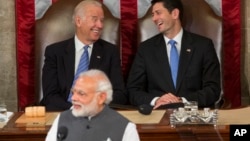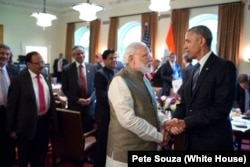As leader of a nation beset with sectarian, religious and ethnic divisions, Indian Prime Minister Narendra Modi sought common understanding with U.S. lawmakers through humor.
“I’m informed that the working of the U.S. Congress is harmonious. I am also told that you are well-known for your bipartisanship,” Modi said to hearty laughter followed by applause, addressing a joint meeting of Congress Wednesday.
“Well, you are not alone. Time and again, I also witness a similar spirit in the Indian Parliament,” he added with playful sarcasm. “As you can see, we have many shared practices.”
Modi returned to humor again and again, noting that more Americans “bend to yoga than throw a curveball,” as the prime minister hailed a deepening relationship between Washington and New Dehli.
From blossoming trade to energy cooperation to shared strategic interests, Modi said the distance and mistrust that once marked U.S.-India ties are a thing of the past.
“Our relationship has overcome the hesitations of history. Candor and convergence define our conversations,” he said, and urged an even closer partnership for shared goals.
Modi’s speech was the sixth delivered by an Indian head of government to the U.S. legislature. It followed Tuesday’s meeting with President Barack Obama and an announcement that India will construct six nuclear reactors to be built by U.S. companies, the result of a civilian nuclear agreement the two countries reached in 2008.
India also aims to approve the Paris climate accord by year’s end.
Senate Majority Leader Mitch McConnell said Modi’s address “shows how far our relationship has come in recent decades. Mutual misgivings have given way to mutual benefits in both the economic and security spheres. We are now key trading partners. We’re the two largest democracies in the world.”
“The growing relationship between us and India, I think, will be a good check and balance to China,” said Republican Senator Lindsey Graham of South Carolina. “They’ve become a regional superpower, and they can help us in Afghanistan and a lot of places.”
Graham added that closer ties with New Dehli do not mean the U.S. is downgrading Pakistan’s importance. “I don’t see it as a zero-sum game,” he said.
“I thought his [Modi’s] emphasis on renewable energy was important,” said Independent Senator Angus King of Maine, who caucuses with Democrats. “The temptation is to build the easiest, cheapest energy generation, and that would be unfortunate.
“I was in India a year and a-half ago, and it’s an incredibly dynamic society. They have great challenges and great opportunities,” King added.
Modi’s visit to Washington prompted protests by Sikhs and other minority groups.
The prime minister said India aspires to heal divisions.
“India kneels as one. India grows as one. India celebrates as one,” he said.
“He [Modi] has a difficult country to run with all kinds of difficult problems,” said Republican Senator Orrin Hatch of Utah. “It’s a large country with a large population, with untold resources and very brilliant people.”
Modi noted that many of India’s best and brightest are flourishing in the United States.
“They are among your best CEOs, academics, astronauts, scientists, economists, doctors – even spelling bee champions,” he said.





